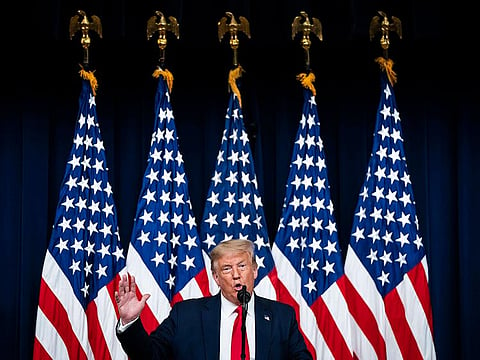Elections 2020: Why Trump loves conspiracy theories
QAnon is not a political tactic that can win over a majority of American voters

Last week’s Democratic National Convention was mainly about decency — about portraying Joe Biden and his party as good people who will do their best to heal a nation afflicted by a pandemic and a depression.
There were plenty of dire warnings about the threat of Trumpism; there was frank acknowledgement of the toll taken by disease and unemployment; but on the whole the message was surprisingly upbeat.
This week’s Republican National Convention, by contrast, however positive its official theme, is going to be QAnon all the way.
I don’t think this desperate strategy is going to work. But it’s all Trump has left. The only thing he can hope for is fear itself — nameless, unreasoning, unjustified terror based on nothing real at all.

I don’t mean that there will be featured speeches claiming that Donald Trump is protecting us from an imaginary cabal of liberal paedophiles, although anything is possible.
But it’s safe to predict that the next few days will be filled with QAnon-type warnings about terrible events that aren’t actually happening and evil conspiracies that don’t actually exist.
That has, after all, been Trump’s style since the very first day of his presidency.
Also Read: COVID-19: Why Trump hates increased testing
Also Read: A cult of selfishness is killing America
Also Read: Why can’t America be like Italy?
Also Read: COVID-19: Major recession set to hit America
Also Read: Racism stares America in the face
New presidents traditionally use their inaugural addresses to deliver a message of hope and unity, even in dark times: “The only thing we have to fear is fear itself.”
Trump, however, offered a vision of “American carnage,” in particular of inner cities devastated by violent crime. His rhetoric was ugly and had clear racial overtones, but it also had another problem: it bore no relationship to reality.
Trump took office in a nation whose violent crime rate had been falling for decades; our big cities were as safe as they had ever been.
America's nonexistent threats
The same pattern of attempts to panic Americans over nonexistent threats recurs throughout this administration. If you get your information from administration officials or Fox News, you probably believe that millions of immigrants in the country illegally cast fraudulent votes, even though actual voter fraud hardly ever happens; that Black Lives Matter protests, which with some exceptions have been remarkably nonviolent, have turned major cities into smoking ruins; and more.
Why this fixation on phantom menaces? There has always been a paranoid style in American politics that sees sinister conspiracies behind social and cultural change — a style going all the way back to fear of Catholic immigrants in the 19th century.
Those of us who remember the 1990s know that QAnon-type conspiracy theories have been out there for decades; they’ve just become more visible thanks to social media and a president who attributes all his failures to the machinations of the “deep state.”
Beyond that, however, a lot of the focus on imaginary threats represents a defensive response from people who repeatedly demonstrated, even before the coronavirus hit, that they have no idea how to do policy, that is, to cope with real threats.
Deaths of despair
After all, America on the day Trump took office was no utopia. The overall economy was doing well, with steady job growth and falling unemployment — trends that continued, with no visible break, for the next three years.
But parts of the country suffered from persistent economic weakness and low employment. Homicides were low, but “deaths of despair” from drugs, suicide and alcohol were rising sharply.
So a president who really cared about American carnage would have had plenty to work on.
But Trump never even tried. His response, such as it was, to regional decline was a trade war that, on net, reduced manufacturing employment.
The rest of his economic policy was standard Republican fare, focused on corporate tax cuts that didn’t even boost business investment. His only visible response to the opioid crisis was a push to take away health insurance from millions.
Then came COVID-19 — which, by the way, has already killed far more Americans than were murdered in the decade that preceded Trump’s inauguration. And the administration’s response, aside from the occasional promotion of quack remedies, has consisted of little but denial and insistence that the whole thing will miraculously go away.
Trump, in other words, can’t devise policies that respond to the nation’s actual needs, nor is he willing to listen to those who can. He won’t even try. And at some level both he and those around him seem aware of his basic inadequacy for the job of being president.
What he and they can do, however, is conjure up imaginary threats that play into his supporters’ prejudices, coupled with conspiracy theories that resonate with their fear and envy of know-it-all “elites.”
QAnon is only the most ludicrous example of this genre, all of which portrays Trump as the hero defending us from invisible evil.
If all of this sounds crazy, that’s because it is. And it’s almost certainly not a political tactic that can win over a majority of American voters.
It might, however, scare enough people that, combined with vote suppression and the unrepresentative nature of the Electoral College, Trump can manage, barely, to hang on to power.
I don’t think this desperate strategy is going to work. But it’s all Trump has left. The only thing he can hope for is fear itself — nameless, unreasoning, unjustified terror based on nothing real at all.
Paul Krugman is one of America’s foremost public intellectuals. He is a Nobel laureate and teaches economics at the City University of New York
— New York Times News Service
Sign up for the Daily Briefing
Get the latest news and updates straight to your inbox









